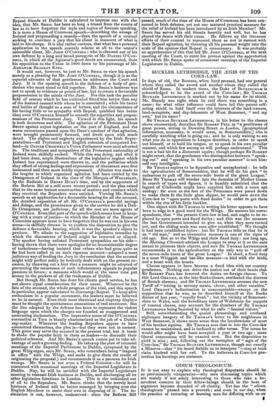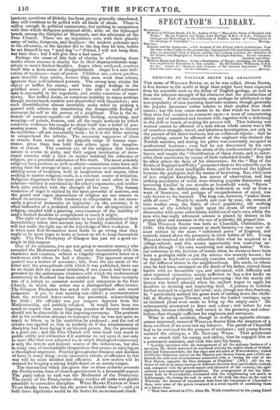ODIUM THEOLOGICUM.
IT is not easy to explain why theological disputants should be so preeminently vituperative—why men discussing topics which are mainly if not solely interesting to those who take a be- nevolent concern in their fellow-beings should in the heat of argument become denuded of all charity. Yet has the "odium theologicum" passed into a proverb ; and even in our day, when the practice of torturing or burning men for differing with us on intricate questions of divinity has been pretty generally abandoned, they still continue to be pelted with all kinds of abuse. There is railing enouqh in political controversy, but nothing in comparison with that which disfigures polemical strife, alike on the Episcopal beach, among the disciples of Maynooth, and the advocates of the Free Church. There are no inquisitors now, with their ghastly array of racks, dungeons, and familiars: the modern polemist says to his adversary, as the Quaker did to the dog that bit him, before he set himself to cry "mad dog"—" Friend, I will not hang thee, nor beat thee ; but I will give thee a bad name."
Perhaps the cause of this lack of charity in advocating those truths whose essence is charity lies in their disproportionate mag- nitude to men's limited faculties. Anger, when analyzed, resolves itself into a keen sense of disappointment. Anger is a sure indi- cation of weakness—want of power. Children are, cmteris paribus, more irascible than adults, women than men, weak than robust, ignorant than well-informed persons. The strong man attains his object or baffles his enemy, and loses angry feelings in the gratified sense of conscious power : the able or well-informed man is successful in his argument, and smiles conscious of supe- riority. But baffled desire, or conscious inability to argue perhaps though unconvinced, renders men dissatisfied with themselves ; and such dissatisfaction almost invariably seeks relief by picking a quarrel with others—by transferring the disagreeable feeling of contempt for self to the person of a neighbour. This is the ra- tionale of nursery-squalls—of infantile kicking, scratching, and weeping—of poison, treason, and all the tragic methods by which conscious weakness has sought to cheat itself into a belief of pos- sessing power. In thinking of religion—in attempting to discuss its mysteries—all are necessarily weak ; for it is the finite striving to comprehend the infinite. The necessary vagueness of ideas so remote from sense and the palpable range of human expe- rience, gives them less hold than others upon the imagina- tion or reason. The constant cry of the religious that human nature is averse to piety, and their urgent inculcation of devo- tional exercise with a view to render habitual the influence of religion, are a practical admission of this truth. The most ardently religious have passions as well as others—sometimes more keen and strong than the average of men ; and in persons so constituted, the abiding sense of weakness, both in imagination and reason, when seeking to master religious truth, is a constant source of irritation. Religious disputants for the most part stand to each other in this relation—neither is convinced by the other's arguments, and neither feels quite satisfied with the strength of his own. The human weakness of anger is excited by the most powerful of motives, and the grand and vague impressions of religion are too remote to check its utterance. This tendency to vituperation is not neces- sarily a proof of insincerity or hypocrisy : on the contrary, it is often indicative of a profound conviction of the all-importance of religion, coupled with a gnawing consciousness of the inability of man's limited faculties to comprehend or teach it aright.
The right of our theological sailers to have this palliation of their inconsistency taken into account may be frankly conceded, if they will but make the right use of the knowledge of their weakness. It is when men find themselves most liable to go wrong that they ought to be most eager to learn or invent an art to keep themselves right. The Free Presbytery of Glasgow has just set a good ex- ample in this respect. One of its members, (we are not going to mention names,) who occupied the Moderator's chair, had, most inconsistently with his character and vocation, written a vulgarly-vituperative letter to a tradesman with whom he had a dispute. The apparent cause of quarrel was a matter of accounts; but, from the use made of the letter and the promptitude with which it was published, there can be DO doubt that the mutual irritation, if not caused, had been ag- gravated by the unfortunate virulence with which the ecclesiastical controversy in Scotland has been carried on. The letter certainly was of a nature to occasion scandal and annoyance in the Free Church, in which the writer was a distinguished office-bearer. The Glasgow Presbytery has acted with promptitude and sound judgment. A pro re mita meeting was called ; a communication from the reverend letter-writer was presented, acknowledging his fault ; the offender was pro tempore deposed from the Moderatorship, and publicly rebuked. It would have been too much to expect that some lingering remains of human weakness should not be discernible in this imposing ceremony. The penitent did in his confession attempt to insinuate that he was not quite so much to blame as in his contrition be professed ; and the rod of rebuke was applied to him as tenderly as if the administrator of discipline had been laying it on his own person. But the precedent is a good one ; and the Free Church will raise itself very much in public utility and estimation if it continue to act upon it, not only in cases like that now adverted to, in which theological controversy is only the remote and indirect source of the indecorous, but also in every case of uncharitable vituperation that occurs in carrying on a theological argument. Practice gives greater firmness and decision of hand in every thing : every successive rebuke of offenders in this way will be more decided and effective. A new motive will be created for keeping a strong bridle-hand on an unruly tongue. The transaction which has given rise to these remarks presents the Presbyterian form of church-government in a favourable aspect. The party taken to task was the Moderator of the Presbytery. The parity of the Presbyterian clergy renders all ranks and grades amenable to corrective discipline. When Hessr EXETER or Joins TIIAM breaks loose, who has the power to rebuke them ?—and vet both these dignitaries would be the better for an occasional check.



























 Previous page
Previous page